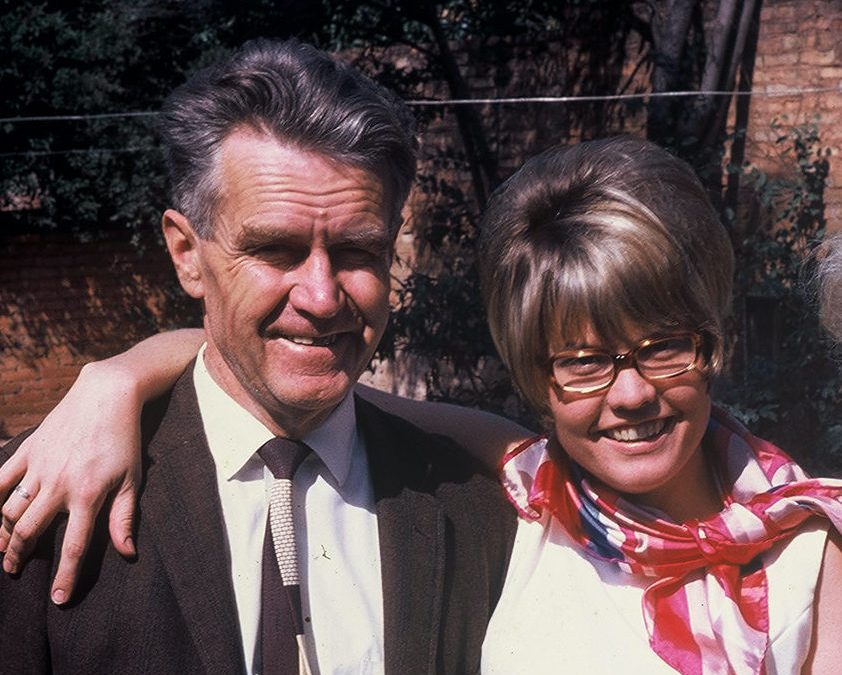My Father and I in 1970
Coming from people who are important to us, there are very few words that can wound us as deeply as, “I’m disappointed in you.”
The words take me back to a rainy cold day in July 1970, in Asunción, Paraguay. I was nineteen.
Here’s an excerpt about that moment from my new book, Nothing Bad Between Us, which will be released by Mango Publishing this fall.
One cold and drizzly July afternoon, I ran through the rain to catch a micro to go home. I had spent six hours with La Doctora, memorizing the Periodic Table of Elements and learning which elements have identical valance electron configurations. (It was all part of making sure I got into medical school that year.)
My head hurt. The rain had begun to come down harder and had soaked through my light rain jacket and blouse. No micro was anywhere in sight.
I stopped at the corner of the cobblestone street, muddy water pooling at my feet and seeping into my shoes. What am I doing? I said aloud to no one. Whose dream was it that I become a medical doctor? Dad’s or mine? With more determination than I had mustered since my world began to crumble about a year ago, I walked the twenty or so blocks back to my pensión, holding my head high in the pouring rain.
The hardest part was telling Dad. I kept thinking about what he had said when I told him I wanted to study medicine. “You’ll make a fine doctor, Marlena.” His eyes had been filled with pride.
One early evening when my father stopped to see me at the end of one of his Asunción shopping trips for the leprosy station, I blurted it out. “Dad, I can’t live in Asunción anymore. I’m done with La Doctora. I don’t even think I want to be a doctor. I don’t know what I want. I just want out.”
“What do you mean, ‘you want out’?” he asked, his brow furrowing. “I’m disappointed in you. I can’t believe you want to just quit, throw away all of the hard work, walk away from it.”
The words stung worse than any physical lashing of his ever had.
Disappointment is sadness or displeasure caused by the nonfulfillment of one’s hopes or expectations. So, my dad’s disappointment in me signaled that I was not fulfilling his hopes and expectations for my life.
Clearly, I was also disappointing myself — not living up to my expectations of becoming a physician. But the self-disappointment didn’t hurt nearly as much as letting down my father.
Jackie Shannon Hollis, my guest on this week’s podcast, has some important things to say about managing others’ disappointments in her life choices, especially the unpopular choice (in her family) to not have a baby.
Jackie says, “I don’t think there’s anything wrong with wanting to have the people around me be happy and finding ways to meet their needs. But if it’s at the expense of my own needs, without ever really questioning my own needs even, that’s where I think the struggle comes in.”
As I look back now to the painful moment in 1970, I understand three important truths about the words, “I’m Disappointed in You.”
- Saying “I’m Disappointed in You” Suggested that It Was My Duty to Meet His Expectations
In 1970, I was too young to understand this, but it was not my duty to fulfill anyone else’s dream for my life, not even my father’s. As Jackie said so well, it feels good to meet another’s needs. But my primary duty was to find my own dream. I was crushed by my father’s reaction, and it took many years for me to finally come around to finding my own passion.
- Saying “I’m Disappointed in You” Indicated His Inability to Manage His Own Feelings
I know that my father was sad that I would throw away the possibility of the brilliant career he pictured me having in medicine. Maybe even angry.
I wish he had been able to begin with, “I feel sad…” or “I feel angry…,” rather than, “I am disappointed…” But at that moment, he was unable to manage those feelings. When I’m unable to manage my feelings of sadness or anger, I’m likely to project them on the other.
- Saying “I’m Disappointed in You” Showed Me How Much He Cared
It’s true. No matter how misplaced the emotions or how hurtful the words, my father’s disappointment in me unmistakably showed how much I mattered to him.
So yes, what I want from those who care about me is anger or sadness when I screw up, not disappointment. But should I again meet the sharp blade of disappointment — and it’s likely that I will — I hope I’ll remember that, bottom line, it means the person cares about me.


Especially in my youth having important older people disappointed in me provided negative pressure that shaped my life. It probably led to me having greater success by trying harder at the cost of often not feeling good about myself over the years. Worldly success typically hasn’t touched the inner message that I’m just not good enough and have to try harder so as not to disappoint.
Ah yes, those inner messages are the most powerful, aren’t they?
As parents, it is very hard to accept and encourage our children to follow their calling and not what we imagine they should be. If they ask for advise, it should always be given. If we see a problem, we should point it out. But we cannot force them to follow our path. They will always be thankful that they had the freedom to choose, regardless of the outcome.
True. And as children, to recognize that our parents’ disappointments in us really did mean that they cared…why else would they be disappointed?
True as well!!